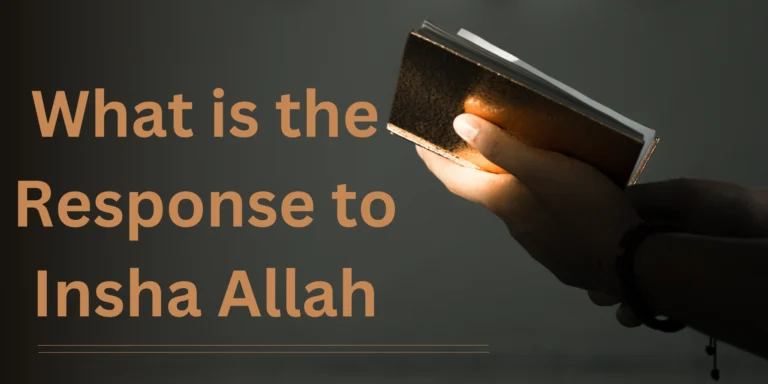Have you ever heard someone say “Inshallah” and wondered what it means? You’re not alone. This phrase is deeply rooted in Arabic culture and Islamic tradition, often used in everyday conversation.
But what does “Inshallah” actually mean, and why do Muslims say it so frequently? More importantly, how should you respond when someone says “Inshallah” to you? We’re here to answer these questions and more.
In this article, we’ll explore the meaning and significance of “Inshallah,” discuss its proper usage, and guide you on how to respond appropriately. By the end, you’ll have a deeper understanding of this beautiful expression and its place in both language and culture.
What Does Inshallah Mean?
“Inshallah” is an Arabic phrase that translates to “If Allah wills it” or “God willing.” It’s commonly used by Muslims when discussing future events or plans. For example, if someone says, “I’ll see you tomorrow, Inshallah,” it means they hope to see you tomorrow if it is God’s will.
The Significance of Inshallah in Islam
Expressing Humility
The use of “Inshallah” is an important aspect of the Islamic faith. It serves as a reminder that all plans and actions are subject to Allah’s will. By saying “Inshallah,” Muslims acknowledge that they do not have complete control over their lives and are ultimately dependent on Allah’s will.
Bringing Blessings and Protection
In Islamic tradition, saying “Inshallah” is believed to bring blessings and protection. It reflects a person’s reliance on Allah for guidance and support. Thus, it is a common practice among Muslims to use “Inshallah” in everyday conversations.
Quranic Reference
The practice of saying “Inshallah” is rooted in the Quran. Allah instructs in Surah Al-Kahf:
“And never say of anything, ‘Indeed, I will do that tomorrow,’ except [when adding], ‘If Allah wills'” (Quran 18:23-24).
Why Do Muslims Say Inshallah?
Future Plans and Events
Muslims say “Inshallah” when making plans or discussing future events. It’s a way of expressing hope and leaving the outcome in God’s hands. For example, “Inshallah, I will pass my exam” means the speaker hopes to pass, but acknowledges that the final outcome is up to Allah.
Acknowledging Allah’s Will
Using “Inshallah” also acknowledges Allah’s sovereignty. It’s a reminder that, despite our efforts, the ultimate control lies with Allah.
How to Reply to Inshallah
Repetition
The most common response to “Inshallah” is to repeat it. If someone says, “Let’s meet tomorrow, Inshallah,” you can reply, “Inshallah.”
Affirmation
You can also affirm the statement with phrases like “Yes, Inshallah” or simply nodding your head.
Additional Responses
In some cultures, people might say “Ameen” (Amen) or “Be-ith-nillah” (With Allah’s permission) as a response.
Inshallah in Arabic
In Arabic, “Inshallah” is written as follows:
ان شاء الله
Some might mistakenly write it as “انشاء الله.” However, the correct form is “ان شاء الله.”
Different Ways to Write Inshallah in English
There are various ways to spell “Inshallah” in English, such as:
- In sha’Allah
- In shaa Allah
- InshAllah
- Insya Allah
- İnşAllah
All these variations are acceptable.
Inshallah Dua
There is no specific “Inshallah Dua.” It is simply an expression used when hoping for something to happen in the future. It’s not meant to be said after reciting a Dua (prayer).
How to Pronounce Inshallah
“Inshallah” is pronounced as:
in-shal-lah
Is It Good to Say Insha Allah?
Quranic Guidance
Yes, it is good to say “Insha Allah.” Allah advises in the Quran to always say “Inshallah” when planning future activities:
“”Never claim, ‘I will definitely do this tomorrow,’ without adding, ‘if Allah wills it.'” (Quran, 18:23). This powerful reminder encourages us to embrace the uncertainty of the future and to remain humble in our plans. Let’s approach each day with intention and gratitude!
Respect and Remembrance
Saying “Insha Allah” is a sign of respect towards Allah and a reminder that everything is in His hands.
Not Obligatory
While it is recommended, it is not obligatory. Forgetting to say it is not considered a sin.
Insha’Allah and Intentions
True Intentions
“Insha’Allah” should be used with sincere intentions. Unfortunately, some people misuse it to avoid commitments or get out of situations. This is not the appropriate way to utilize it.
Misuse and Misunderstanding
Using “Insha’Allah” insincerely can lead others to believe it means “no.” Remember, it should be used when you genuinely hope for something to happen, not as an excuse.
How to Use Inshallah
Discussing Future Events
Use “Inshallah” when talking about future events or plans. For example:
- “You’ll be healed soon, Inshallah.”
- “Inshallah, you will pass the exam.”
- “See you tomorrow, Inshallah.”
Everyday Conversations
Incorporate “Inshallah” into your daily conversations to express hope and reliance on Allah.
How to Write Inshallah
Flexibility in Writing
You can write “Inshallah” in various forms, such as “In shaa Allah,” “inshallah,” or “insya Allah.” There is no single correct way to write it.
Transliteration
Transliteration aims to make words from different languages understandable. Therefore, use the form that feels right for you.
When to Use Inshallah
Use “Inshallah” whenever you hope for something to happen or when planning future events. It’s a way to express your wishes while acknowledging Allah’s will.
Inshallah vs Mashallah
Future vs Past
“Inshallah” is used when talking about future events, meaning “if Allah wills.”
“Mashallah,” on the other hand, means “what God has willed” and is used to appreciate something good that has happened in the past.
Conclusion
Understanding and using “Inshallah” correctly deepens your appreciation for this beautiful phrase. It’s a powerful reminder of humility, respect, and reliance on Allah’s will. Whether you’re a Muslim or someone interested in learning more about Islamic culture, knowing the proper usage and responses to “Inshallah” enriches your interactions.

